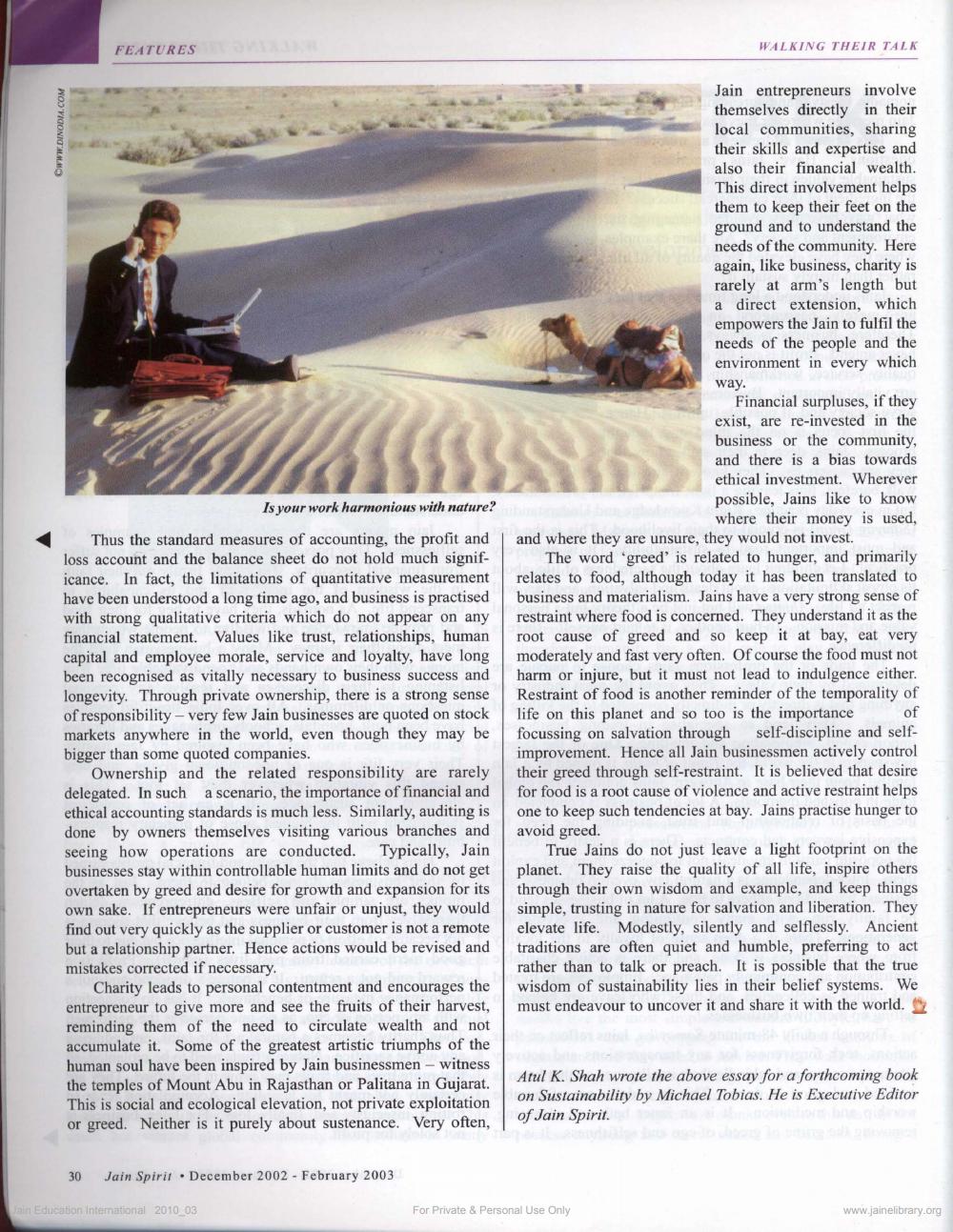________________
FEATURES
30
Is your work harmonious with nature?
Thus the standard measures of accounting, the profit and loss account and the balance sheet do not hold much significance. In fact, the limitations of quantitative measurement have been understood a long time ago, and business is practised with strong qualitative criteria which do not appear on any financial statement. Values like trust, relationships, human capital and employee morale, service and loyalty, have long been recognised as vitally necessary to business success and longevity. Through private ownership, there is a strong sense of responsibility - very few Jain businesses are quoted on stock markets anywhere in the world, even though they may be bigger than some quoted companies.
Ownership and the related responsibility are rarely delegated. In such a scenario, the importance of financial and ethical accounting standards is much less. Similarly, auditing is done by owners themselves visiting various branches and seeing how operations are conducted. Typically, Jain businesses stay within controllable human limits and do not get overtaken by greed and desire for growth and expansion for its own sake. If entrepreneurs were unfair or unjust, they would find out very quickly as the supplier or customer is not a remote but a relationship partner. Hence actions would be revised and mistakes corrected if necessary.
Charity leads to personal contentment and encourages the entrepreneur to give more and see the fruits of their harvest, reminding them of the need to circulate wealth and not accumulate it. Some of the greatest artistic triumphs of the human soul have been inspired by Jain businessmen - witness the temples of Mount Abu in Rajasthan or Palitana in Gujarat. This is social and ecological elevation, not private exploitation or greed. Neither is it purely about sustenance. Very often,
Jain Spirit December 2002 February 2003
Jain Education International 2010_03
WALKING THEIR TALK
Financial surpluses, if they exist, are re-invested in the business or the community, and there is a bias towards ethical investment. Wherever possible, Jains like to know where their money is used, and where they are unsure, they would not invest.
The word 'greed' is related to hunger, and primarily relates to food, although today it has been translated to business and materialism. Jains have a very strong sense of restraint where food is concerned. They understand it as the root cause of greed and so keep it at bay, eat very moderately and fast very often. Of course the food must not harm or injure, but it must not lead to indulgence either. Restraint of food is another reminder of the temporality of life on this planet and so too is the importance focussing on salvation through self-discipline and selfimprovement. Hence all Jain businessmen actively control their greed through self-restraint. It is believed that desire for food is a root cause of violence and active restraint helps one to keep such tendencies at bay. Jains practise hunger to avoid greed.
of
Jain entrepreneurs involve themselves directly in their local communities, sharing their skills and expertise and also their financial wealth. This direct involvement helps them to keep their feet on the ground and to understand the needs of the community. Here again, like business, charity is rarely at arm's length but a direct extension, which empowers the Jain to fulfil the needs of the people and the environment in every which way.
True Jains do not just leave a light footprint on the planet. They raise the quality of all life, inspire others through their own wisdom and example, and keep things simple, trusting in nature for salvation and liberation. They elevate life. Modestly, silently and selflessly. Ancient traditions are often quiet and humble, preferring to act rather than to talk or preach. It is possible that the true wisdom of sustainability lies in their belief systems. We must endeavour to uncover it and share it with the world.
For Private & Personal Use Only
Atul K. Shah wrote the above essay for a forthcoming book on Sustainability by Michael Tobias. He is Executive Editor of Jain Spirit.
www.jainelibrary.org




